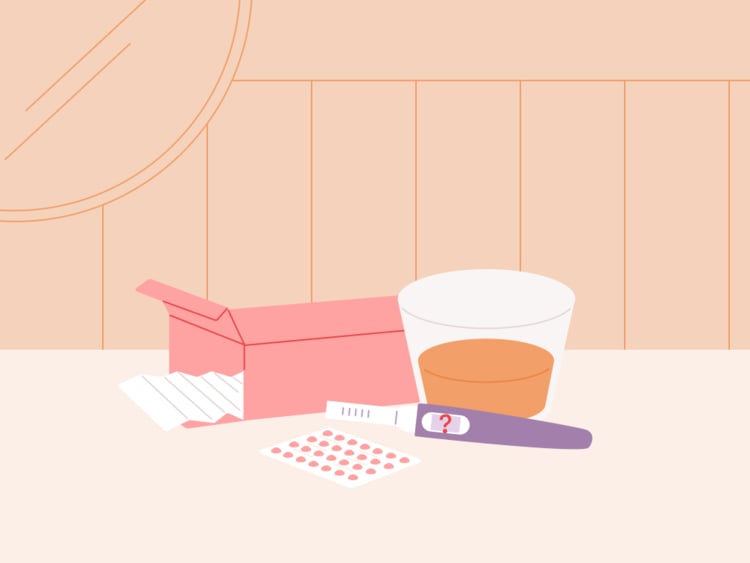Get to know all the possible reasons for a missed withdrawal bleed on your pill-free week with advice from a Flo expert.
-
Tracking cycle
-
Getting pregnant
-
Pregnancy
-
Help Center
-
Flo for Partners
-
Anonymous Mode
-
Flo app reviews
-
Flo Premium New
-
Secret Chats New
-
Symptom Checker New
-
Your cycle
-
Health 360°
-
Getting pregnant
-
Pregnancy
-
Being a mom
-
LGBTQ+
-
Quizzes
-
Ovulation calculator
-
hCG calculator
-
Pregnancy test calculator
-
Menstrual cycle calculator
-
Period calculator
-
Implantation calculator
-
Pregnancy weeks to months calculator
-
Pregnancy due date calculator
-
IVF and FET due date calculator
-
Due date calculator by ultrasound
-
Medical Affairs
-
Science & Research
-
Pass It On Project New
-
Privacy Portal
-
Press Center
-
Flo Accuracy
-
Careers
-
Contact Us
No period on your pill-free week? Let’s find out why


Every piece of content at Flo Health adheres to the highest editorial standards for language, style, and medical accuracy. To learn what we do to deliver the best health and lifestyle insights to you, check out our content review principles.
It can be alarming any time your period doesn’t show up when you’re expecting it to. But when you’re on birth control, a missed bleed on your pill-free week can be even more surprising. The pill is supposed to keep things regular, right?
But first things first: A missed period on birth control pills is technically a missed withdrawal bleed, which is different from a period. Rest assured that missing a withdrawal bleed doesn’t necessarily indicate pregnancy. Keep reading to find out what might be going on and what you should do about it.
Key takeaways
- A withdrawal bleed is caused by your body’s reaction to the pause in hormones during your pill-free week.
- A missed withdrawal bleed can be a normal reaction to hormonal birth control. It can happen because the pill contains the hormone progestin, which can sometimes make the lining of your uterus so thin that there’s nothing to shed.
- While it’s common not to get a bleed during the pill-free week, sometimes a missed withdrawal bleed can be a sign of pregnancy. However, the pill is very effective, so as long as you’re taking it correctly, this is unlikely.
How birth control pills affect your period
The bleeding you get during your pill-free week isn’t technically a period. We’ll explain. In a normal menstrual cycle, your body releases an egg (ovulation), which could be fertilized by a sperm. If this happens, the fertilized egg will then implant itself into the lining of your uterus, and you will become pregnant. If fertilization and implantation don’t happen, it triggers the lining of your uterus to shed, and you will get your period.
Now, the hormones in oral contraceptives work to prevent pregnancy by stopping ovulation — which means they stop menstruation from happening, too.
So, if the blood during your pill-free week isn’t an ovulation-induced period, what is it? Known as a withdrawal bleed, this type of uterine bleeding is simply your body’s reaction to having a pause in the hormones you’ve been getting via birth control pills.
“You get a withdrawal bleed at the end of a pill pack because the last set of pills are placebo pills that have no hormone,” says Flo expert Dr. Renita White, obstetrician and gynecologist, Georgia Obstetrics and Gynecology, US. “Withdrawal bleeding can be lighter, shorter, and less crampy than a true period.”
Why you might not get a withdrawal bleed on a pill break
Before your mind runs away with you, know that missing a withdrawal bleed can be perfectly normal for some people. This is because some of us simply react to the hormones in hormonal birth control in a way that stops us from getting a bleed.
Here’s the science: All birth control pills contain a hormone called progestin (a synthetic version of progesterone), which works alongside estrogen (in the combined pill) or on its own (in the mini pill) to stop ovulation from happening.
However, progestin also thins the lining of the uterus. This is another way it protects from pregnancy because a fertilized egg needs a thick lining to implant into the uterus and become an embryo. In some women, progestin stops the growth of the lining so much that there is nothing left for the uterus to shed (or bleed). In these cases, it’s easy to see why there might be no bleeding during the pill-free week at all.
Take a quiz
Find out what you can do with our Health Assistant
When it comes to getting birth control pills, there are various types of this contraception — and some can make you more likely than others to miss a withdrawal bleed. “Some pills have a smaller number of placebo pills (four rather than seven), so the withdrawal bleed may be shorter, or you can miss the bleed altogether,” says Dr. White. You can also get pill packs that include just four pill-free weeks a year and others that are designed to be taken continuously with no pill-free weeks at all. If you’ve got questions about which birth control pill might be right for you, then have a chat with your doctor.
Pregnancy
Although the pill is an effective type of birth control, there is still a chance that you could get pregnant, especially if you’re not taking it perfectly. With perfect use (i.e., if you take the pill consistently and exactly as your pill packet reccomends), the pill has a failure rate of just 0.3%. That means for every 100 people using the pill in a year, fewer than one will get pregnant. But with typical use (i.e., if you don’t take the pill correctly), the pill has a failure rate of 7%, meaning seven people in every 100 would get pregnant in a year.
Missing a withdrawal bleed could be a sign of pregnancy. “If you get pregnant, the uterine lining will not shed, so there will be no withdrawal bleeding,” explains Dr. White. That’s why it’s a good idea to take a pregnancy test if you don’t get a withdrawal bleed for one month, just so you know for sure.
Taking continuous birth control
If you take active pills (the ones with hormones, not placebo pills) continuously, you can skip your withdrawal bleeds. You may want to do this for a number of reasons. For example, you might find the bleeding makes symptoms from another condition worse, like endometriosis (where tissue similar to the lining of the uterus grows in other places in the body) or anemia (low iron). Or you may want to avoid menstrual symptoms that bug you during the pill-free week. You might also simply want to delay your withdrawal bleed temporarily if you’re going on vacation or have another special occasion coming up.
You should always check with your health care provider first before taking the birth control pill continuously. But as withdrawal bleeding isn’t essential for your health, it should be safe for you to use birth control pills to delay or stop the bleeding as long as your doctor agrees. It’s worth flagging, though, that skipping your withdrawal bleeds can lead to spotting or bleeding between periods, also known as breakthrough bleeding, so don’t be surprised if you notice this. Your doctor can help you weigh the pros and cons and decide on the best birth control schedule for you.
What to do if you miss a withdrawal bleed while on a pill break
If you’re worried you might be pregnant or that you haven’t been taking the pill correctly, start by taking a pregnancy test. It is common to not get a withdrawal bleed after using the pill for a while, but you can speak to your health care provider to make sure there is nothing else going on.

Taking a pregnancy test can be nerve-racking, but know that pregnancy is unlikely if you’ve been taking your contraception correctly. As we’ve seen, with perfect use, birth control pills have an effectiveness rate of 99.7%, which means that fewer than one person in every 100 will get pregnant in a year of using the contraception.
Using the Flo app to set reminders can help you to always take the pill on time and make sure it’s working as effectively as possible.
Should you be worried if you don’t get your withdrawal bleeding on the pill?
There’s no need to panic if you don’t get a withdrawal bleed on birth control pills, as skipping a bleed can sometimes be a normal reaction to the hormones you’ve been getting from the contraception. If the hormones make the lining of your uterus thin enough, then there will be nothing to shed.
More FAQs
How many days into a pill-free week do you bleed?
Exactly when a withdrawal bleed starts will vary from person to person, but it usually appears a couple of days into your pill break.
How would you know if you’re pregnant while on the pill?
Know that the symptoms of pregnancy on birth control pills are the same as when you’re not on the pill. It can vary from person to person, but signs can include a missed period or withdrawal bleeding, nausea, fatigue, needing to pee more frequently, and having sore or swollen breasts. If you regularly skip your pill-free week and withdrawal bleed, then it can be more difficult to tell if you become pregnant, so it’s a good idea to take a test if you’re worried and to be familiar with the other early signs of pregnancy.
Why do I have cramps but no withdrawal bleeding while on birth control?
“Some methods cause such light withdrawal bleeding that you may not see blood, but you may still have the cramping due to uterine activity during the expected cycle,” says Dr. White.
Can you get pregnant if you have breakthrough bleeding on the pill?
If you experience breakthrough bleeding on the pill, it isn’t a sign that the pill isn’t working. As long as you take your pill correctly, you will be protected from pregnancy throughout your pill-free week and active pill weeks.


Hey, I'm Anique
I started using Flo app to track my period and ovulation because we wanted to have a baby.


The Flo app helped me learn about my body and spot ovulation signs during our conception journey.


I vividly
remember the day
that we switched
Flo into
Pregnancy Mode — it was
such a special
moment.
Real stories, real results
Learn how the Flo app became an amazing cheerleader for us on our conception journey.
References
“Am I Pregnant?” Cleveland Clinic, my.clevelandclinic.org/health/articles/9709-pregnancy-am-i-pregnant. Accessed 3 Apr. 2024.
“Birth Control.” Mayo Clinic, 2 Dec. 2022, www.mayoclinic.org/healthy-lifestyle/birth-control/in-depth/womens-health/art-20044044.
“Birth Control Pills.” Cleveland Clinic, my.clevelandclinic.org/health/treatments/3977-birth-control-the-pill. Accessed 3 Apr. 2024.
“Breastfeeding and Birth Control.” Journal of Midwifery and Women’s Health, vol. 69, no. 1, 25 Jan. 2024, pp. 171–72, doi: 10.1111/jmwh.13612.
“Combination Birth Control Pills.” Mayo Clinic, 13 Jan. 2023, www.mayoclinic.org/tests-procedures/combination-birth-control-pills/about/pac-20385282.
“Contraception.” Centers for Disease Control and Prevention, www.cdc.gov/reproductivehealth/contraception/index.htm. Accessed 3 Apr. 2024.
“Is Breakthrough Bleeding More Common with Extended-Cycle Birth Control Pills, Such as Seasonale and Others?” Mayo Clinic, 7 Dec. 2022, www.mayoclinic.org/healthy-lifestyle/birth-control/expert-answers/seasonale-side-effects/faq-20058109.
“Family Planning/Contraception Methods.” World Health Organization, 5 Sep. 2023, www.who.int/news-room/fact-sheets/detail/family-planning-contraception.
“Family Planning: A Global Handbook for Providers.” World Health Organization, 14 Nov. 2022, www.who.int/publications/i/item/9780999203705.
“Oral Contraceptives: Skipping Periods When Taking the Pill.” The Royal Children’s Hospital Melbourne, www.rch.org.au/kidsinfo/fact_sheets/Oral_contraceptives_skipping_periods_when_taking_the_Pill/. Accessed 3 Apr. 2024.
“Menstrual Cycle.” Cleveland Clinic, my.clevelandclinic.org/health/articles/10132-menstrual-cycle. Accessed 3 Apr. 2024.
“Minipill (Progesterone-Only Birth Control Pill).” Cleveland Clinic, my.clevelandclinic.org/health/drugs/17707-minipill. Accessed 3 Apr. 2024.




